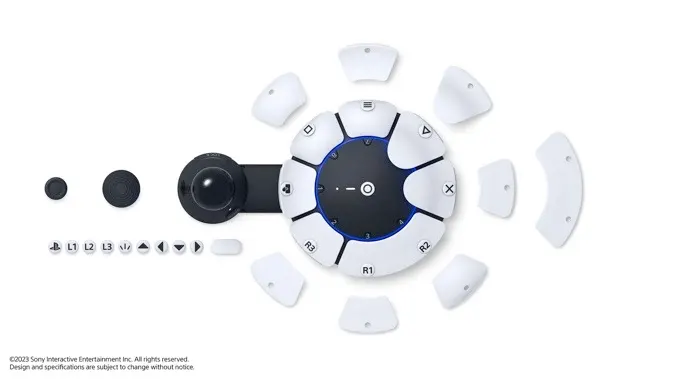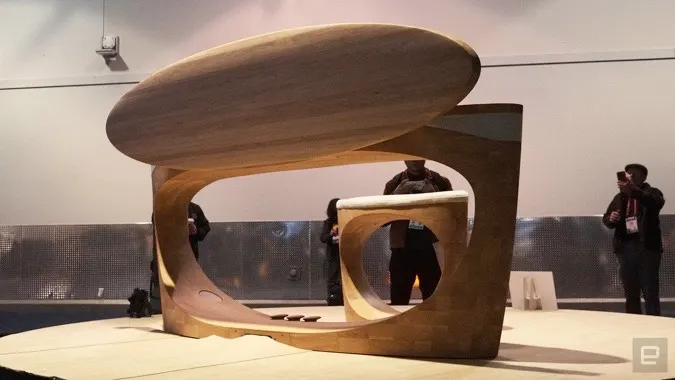After canceling our CES plans in 2022 (and there wasn’t even a show in 2021), the Engadget team sent a dozen staffers to this year’s CES. The show wasn’t as busy as in pre-pandemic years, but many events were packed, and companies had plenty of announcements to dig into. So, what was the best of CES? You can check out all the award winners right here.
Our Best of the Best winner wasn’t a car or a TV that sticks to the wall. No, it’s Project Leonardo. This is Sony’s first piece of gaming hardware designed specifically for people with limited motor control – and it’s rather eye-catching.

Sony
This controller kit works out of the box with the PlayStation 5, offering two circular gamepads lined with swappable buttons, third-party accessory ports and other customizable inputs. The controllers sit flat on a table or mounted on a standard tripod. They can also pair with a DualSense to turn all three devices into a single gamepad, offering plenty of flexibility.
To make sure it delivered on its accessibility promises, Sony partnered with advocacy organizations including AbleGamers, SpecialEffect and Stack Up, much like Microsoft did with the revolutionary Xbox Adaptive Controller. Though there’s no release date or price for Project Leonardo yet, Sony is finally seizing an opportunity to expand the PS5 player base.
– Mat Smith
The Morning After isn’t just a newsletter – it’s also a daily podcast. Get our daily audio briefings, Monday through Friday, by subscribing right here.
The biggest stories you might have missed
The launch could come at the expense of the company’s other products.
According to Bloomberg’s Mark Gurman, Apple plans to announce its first mixed reality headset this spring, ahead of its annual WWDC conference in June. In a sign that a launch is finally on the horizon, Apple has reportedly shared the headset with a handful of high-profile software developers, giving them a first look at its new xrOS software. A focus on its newest hardware line will allegedly affect its heavy hitters, however.
The next version of the company’s iOS operating system will likely ship with “fewer major changes than originally planned” due to Apple reassigning software engineers to the xrOS team. “The same goes for macOS 14,” Gurman adds. The company apparently has no updates “of note” for its iPad, Apple Watch and audio product lines.
Ridiculous but beautiful.

Engadget
Roland’s 50th-anniversary celebration included a gorgeous Anniversary Concept Piano, built in collaboration with Japanese furniture maker Karimoku. The outside is one piece molded from Japanese Nara oak that hides a 360-degree 14-speaker system. Roland also built speakers into drones that hover above the piano, controlled by the player. Unfortunately, those couldn’t be flown on the showfloor at CES, because safety, so Roland dangled a pair of them from wires. Boo.
A Galaxy Unpacked event is scheduled that day.
Samsung may have inadvertently confirmed it’ll unveil its next flagship phones early next month. The company’s Colombian website published a page revealing its next Galaxy Unpacked event is scheduled for February 1st, 2023. “Epic moments are approaching,” it read before the page was pulled offline. Samsung’s showcase for its flagship devices has crept earlier in the calendar over the years: For the Galaxy S22 series, Samsung held an event on February 9th, 2022.
The features that matter, in a lighter package.
HTC is hitting back at Meta’s Pro VR headset with the Vive XR Elite. The XR Elite matches plenty of the Quest Pro’s highlight specs, including support for 2K resolution to each eye, a 90Hz refresh rate and full standalone operation. However, weighing 625 grams (versus 722 for the Quest Pro) and with a more comfortable headband, the XR Elite does an even better job of delivering a breezy portable VR/AR experience. Despite its high points, the XR Elite also shares a lot of the same flaws as the Quest Pro. Starting at $1,099, it’s a bit cheaper than Meta’s $1,500 rival, but still pretty expensive. We put it to the test on the showfloor at CES 2023.
Trend alert: Urine analysis tech.
While none claimed a Best of CES award from Engadget, there was a boom in toilet-bowl technology. You could pitch this as a natural evolution of the fitness tracker, testing your pee for many easy-to-identify maladies. But is this truly the next frontier of consumer health tracking? These devices might never have the popularity of a Fitbit, but for medical facilities and assisted living complexes, they could be game-changing.
All products recommended by Engadget are selected by our editorial team, independent of our parent company. Some of our stories include affiliate links. If you buy something through one of these links, we may earn an affiliate commission. All prices are correct at the time of publishing.

